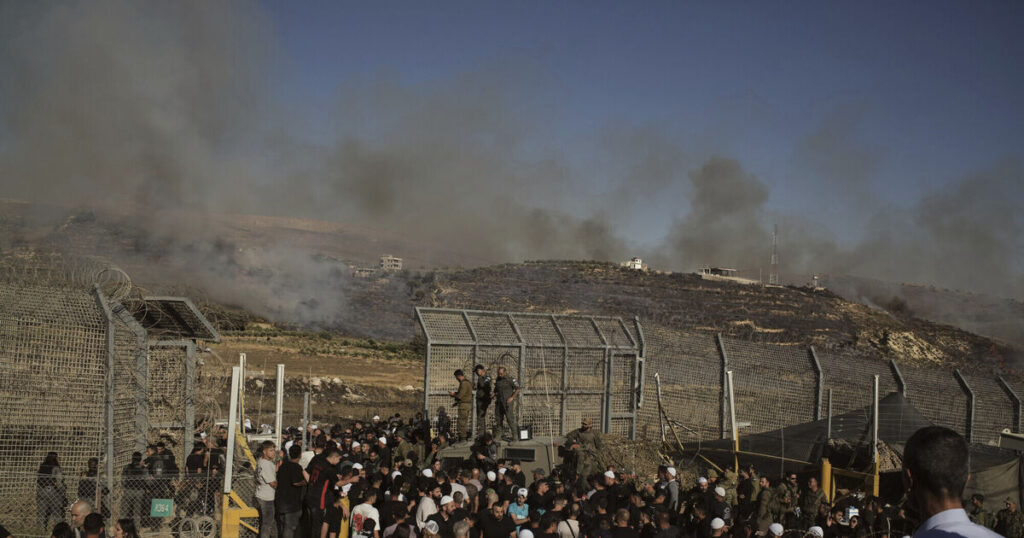Syrian government officials and leaders of the Druze religious minority have announced a renewed ceasefire after days of clashes that have threatened to unravel the country’s post-war political transition.
It was not immediately clear if the new agreement – which was announced by Syrian state media and in a video message by a Druze religious leader – would hold.
A previous ceasefire announced the day before quickly fell apart.
The announcement came after Israel launched a series of rare air strikes in the heart of Damascus, part of a campaign that it said is intended to defend the Druze – who also form a substantial community in Israel – and to push Islamic militants away from its border.
The escalating violence has appeared to be the most serious threat yet to the ability of Syria’s new rulers to consolidate control of the country after a rebel offensive led by Islamist insurgent groups ousted long-time despotic leader, Bashar Assad, in December, bringing an end to a nearly 14-year civil war.
As clashes have raged for days in the southern Syrian city of Sweida between government forces and Druze armed groups, Israel has launched dozens of strikes targeting government troops and convoys, and on Wednesday struck the Syrian Defence Ministry headquarters in the heart of Damascus.
That strike killed one person and injured 18, Syrian officials said. Another strike hit near the presidential palace in the hills outside Damascus.
Israeli defence minister Israel Katz said after the air strike in a post on X that the “painful blows have begun”.
An Israeli military official said the army was preparing for a “multitude of scenarios” and that a brigade, normally comprising thousands of soldiers, was being pulled out of Gaza and sent to the Golan Heights.
Syria’s Defence Ministry had earlier blamed militias in the Druze-majority area of Sweida for violating a ceasefire agreement that had been reached on Tuesday, causing Syrian army soldiers to return fire.
It said they were “adhering to rules of engagement to protect residents, prevent harm, and ensure the safe return of those who left the city back to their homes”.
Meanwhile, reports of attacks on civilians continued to surface, and Druze with family members in the conflict zone searched desperately for information about their fate amid communication blackouts.
The primarily Sunni Muslim leaders have faced suspicion from religious and ethnic minorities, whose fears increased after clashes between government forces and pro-Assad armed groups in March spiralled into sectarian revenge attacks.
Hundreds of civilians from the Alawite religious minority, to which Assad belongs, were killed.
In Jaramana near the Syrian capital, Evelyn Azzam, 20, said she fears that her husband, Robert Kiwan, 23, is dead. The newlyweds live in the Damascus suburb but Mr Kiwan would commute to Sweida for work each morning and got trapped there when the clashes erupted.
Ms Azzam said she was on the phone with Mr Kiwan when security forces questioned him and a colleague about whether they were affiliated with Druze militias. When her husband’s colleague raised his voice, she heard a gunshot. Mr Kiwan was then shot while trying to appeal.
“They shot my husband in the hip from what I could gather,” she said, struggling to hold back tears. “The ambulance took him to the hospital. Since then, we have no idea what has happened.”
The Druze religious sect began as a 10th-century offshoot of Ismailism, a branch of Shiite Islam.
More than half the roughly one million Druze worldwide live in Syria. Most of the other Druze live in Lebanon and Israel, including in the Golan Heights, which Israel captured from Syria in the 1967 Middle East War and annexed in 1981.
In Israel, the Druze are seen as a loyal minority and often serve in the military.
In Syria, the Druze have been divided over how to deal with the country’s new leaders, with some advocating for integrating into the new system while others have remained suspicious of the authorities in Damascus and pushed for an autonomous Druze region.
On Wednesday, Israeli defence minister Israel Katz said in a statement that the Israeli army “will continue to attack regime forces until they withdraw from the area — and will also soon raise the bar of responses against the regime if the message is not understood”.


